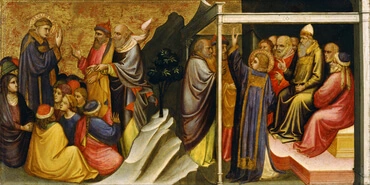1
And these [are] births of the sons of Noah, Shem, Ham, and Japheth; and born to them are sons after the deluge.
2
`Sons of Japheth [are] Gomer, and Magog, and Madai, and Javan, and Tubal, and Meshech, and Tiras.
3
And sons of Gomer [are] Ashkenaz, and Riphath, and Togarmah.
4
And sons of Javan [are] Elishah, and Tarshish, Kittim, and Dodanim.
5
By these have the isles of the nations been parted in their lands, each by his tongue, by their families, in their nations.
6
And sons of Ham [are] Cush, and Mitzraim, and Phut, and Canaan.
7
And sons of Cush [are] Seba, and Havilah, and Sabtah, and Raamah, and Sabtechah; and sons of Raamah [are] Sheba and Dedan.
8
And Cush hath begotten Nimrod;
9
he hath begun to be a hero in the land; he hath been a hero in hunting before Jehovah; therefore it is said, `As Nimrod the hero [in] hunting before Jehovah.'
10
And the first part of his kingdom is Babel, and Erech, and Accad, and Calneh, in the land of Shinar;
11
from that land he hath gone out to Asshur, and buildeth Nineveh, even the broad places of the city, and Calah,
12
and Resen, between Nineveh and Calah; it [is] the great city.
13
And Mitzraim hath begotten the Ludim, and the Anamim, and the Lehabim, and the Naphtuhim,
14
and the Pathrusim, and the Casluhim, (whence have come out Philistim,) and the Caphtorim.
15
And Canaan hath begotten Sidon his first-born, and Heth,
16
and the Jebusite, and the Amorite, and the Girgashite,
17
and the Hivite, and the Arkite, and the Sinite,
18
and the Arvadite, and the Zemarite, and the Hamathite; and afterwards have the families of the Canaanite been scattered.
19
And the border of the Canaanite is from Sidon, [in] thy coming towards Gerar, unto Gaza; [in] thy coming towards Sodom, and Gomorrah, and Admah, and Zeboim, unto Lasha.
20
These [are] sons of Ham, by their families, by their tongues, in their lands, in their nations.
21
As to Shem, father of all sons of Eber, brother of Japheth the elder, he hath also begotten:
22
Sons of Shem [are] Elam, and Asshur, and Arphaxad, and Lud, and Aram.
23
And sons of Aram [are] Uz, and Hul, and Gether, and Mash.
24
And Arphaxad hath begotten Salah, and Salah hath begotten Eber.
25
And to Eber have two sons been born; the name of the one [is] Peleg (for in his days hath the earth been divided,) and his brother's name [is] Joktan.
26
And Joktan hath begotten Almodad, and Sheleph, and Hazarmaveth, and Jerah,
27
and Hadoram, and Uzal, and Diklah,
28
and Obal, and Abimael, and Sheba,
29
and Ophir, and Havilah, and Jobab; all these [are] sons of Joktan;
30
and their dwelling is from Mesha, [in] thy coming towards Sephar, a mount of the east.
31
These [are] sons of Shem, by their families, by their tongues, in their lands, by their nations.
32
These [are] families of the sons of Noah, by their births, in their nations, and by these have the nations been parted in the earth after the deluge.







